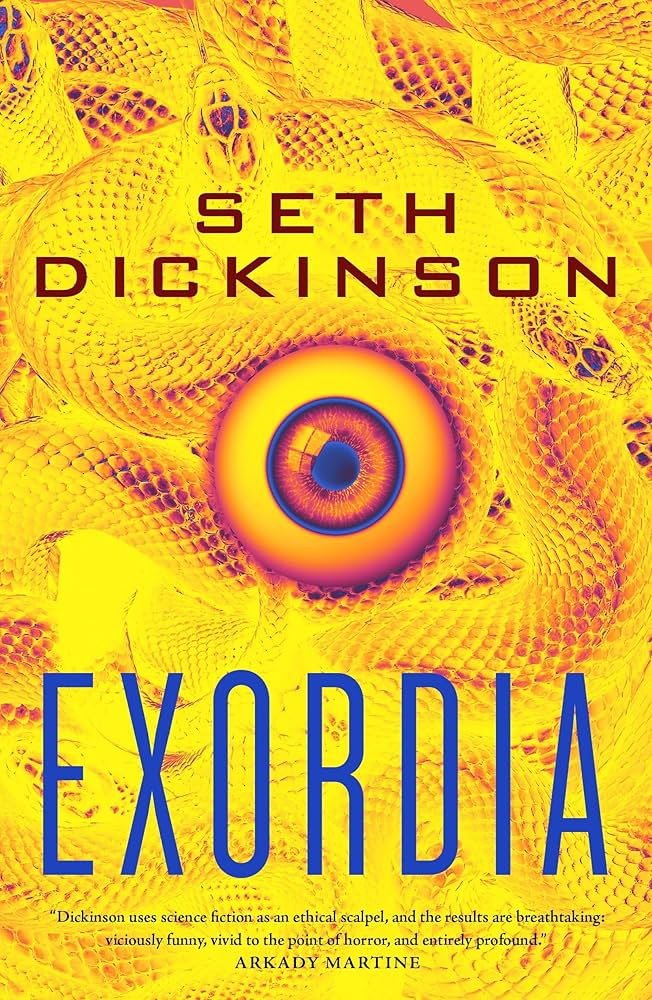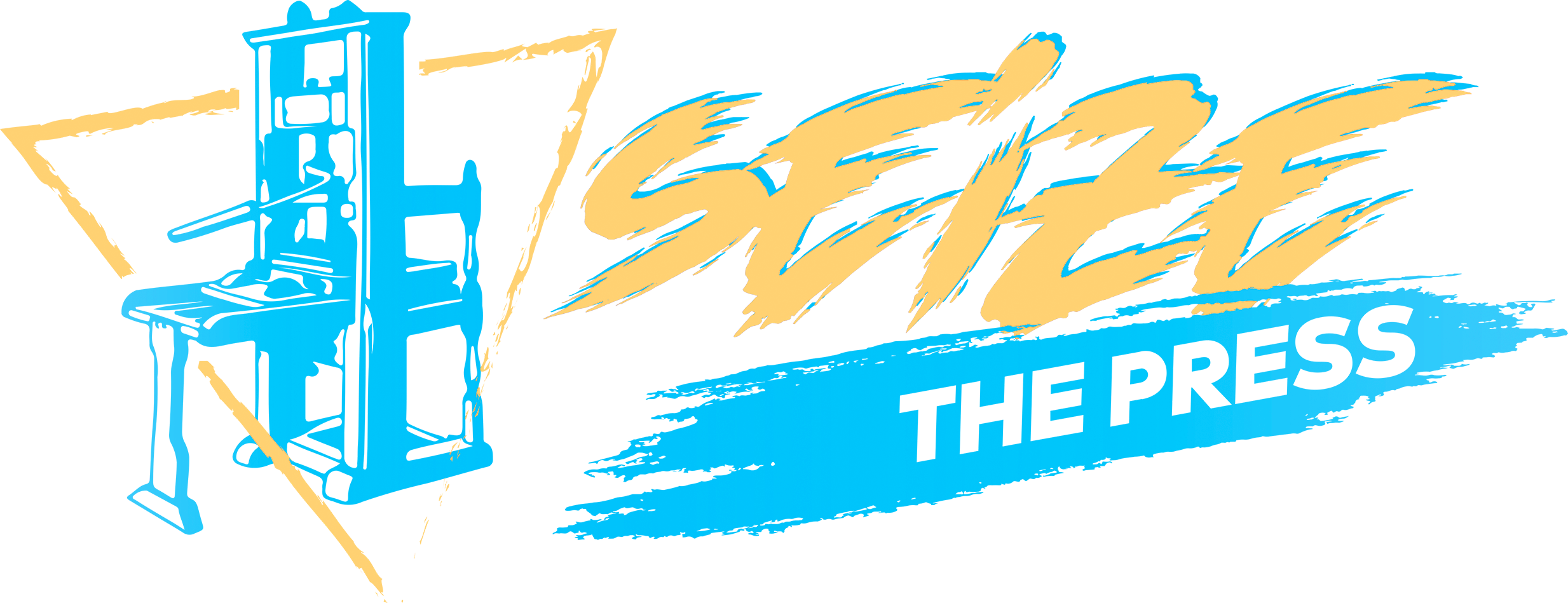In the acknowledgments to Seth Dickinson’s new science fiction novel, Exordia, he says that it was “supposed to be a fun book,” and a look at the epigraphs does an unusually good job at conveying exactly what sort of fun this is going to be. From Michael Crichton’s Sphere, we can deduce an alien contact thriller, tinged with cosmic horror and packed with conflicted technophilia; from President Barack Obama’s quote about discovering he’s “really good at killing people,” we might expect a cutting and slightly cynical dive into the amorality of imperial politics. The final epigraph, from Saint Isaac the Syrian, hints at deeper layers here—immortal souls, the torment of love, and the theological contradiction of Hell, in a book about aliens? Well, this is the author of the Traitor Baru books, contender for the smartest and most crushing fantasy work yet written; it’s well worth seeing how this “fun” plays out.

The novel begins tightly focused, introducing us to Anna Sinjari, a Kurdish refugee working in New York, and her new friend Ssrin: an eight-headed alien seeking the ancient artifact that will break the reign of her species’ evil empire, the Exordia. When that artifact—Blackbird, a deadly puzzle and maybe-starship—appears in central Kurdistan, all hell breaks loose: the Exordia attack the planet, and Anna, Ssrin, and a massive cast of shakily-defined allies, including scientists, military operators, and Anna’s mom, rush to solve Blackbird’s mysteries, or at least survive them, as global disaster looms.
Even as Exordia’s themes and imagery rapidly darken—from Anna’s experiences in the Kurdish genocide to Blackbird’s Carpenter-esque effects on hapless humans and the gore-spattered military action of the novel’s last sections—it is, it must be said, an immensely entertaining read. Dickinson writes with an energetic and thoughtful irreverence that occasionally put me in mind of Peter Watts—that kind of scientific realism that looks like pessimism but sounds almost gleeful—and he has the all-too-rare gift of being able to make fairly nerdy cultural references without inducing groans. He has a knack for keeping a lot of narrative balls in the air, and a flair for startling imagery—being brought back to life by alien technology is like “a woodchipper in reverse”; a particular cursed weapon looks like “the premature fetus of a Nazgûl impregnated by a stealth bomber.” The novel’s structure is ambitious, and it’s suspenseful and propulsive despite its complexity. Both the Blackbird investigation and the alien invasion are involved plots with tons of detail and supporting characters; Dickinson employs a set of alternating viewpoints and timelines, many framed as before or after key events to keep a clock ticking in the reader’s mind. Crichton is an obvious touchpoint for this kind of thriller hybrid (I’m not sure if his misanthropy and quasi-Luddism are absent in Dickinson, or simply deeper), and a surprising and welcome one is Greg Bear—Exordia shows traces of the kind of ideas that make Eon or Blood Music such delights.
What I found myself appreciating most about this novel is the way it’s trying to grapple with the kind of bleak galactic game theory you find in science fiction such as The Three Body Problem, and trying to reject any glib denial of the actuality of evil at the same time—there’s a few passages that seem to be imploding the grotesque optimism of Pinker’s The Better Angels of Our Nature. Exordia sets up, in its titular alien empire, a clear analog to the evils of earthly imperialism—specifically, the European colonial powers and the current American hegemony. This is critique of the War of the Worlds type, no less valid for its simplicity: sure would suck if anyone did to our civilization what we’ve done to so many others! And, if the novel struggles to verbalize a response to imperial violence beyond “it sucks,” the way it anchors its science fictional conceits in real world history is excellently done; the novel doesn’t go long on the mechanics of jineology or democratic confederalism—Kurdish political technologies aspiring to effective liberation—but just flagging them for our attention is points in its favor.
It’s remarkably refreshing to have a story like this anchored in actual politics, actual history, down to having an actual US president in office. (Obama’s speech when the aliens attack is good, we’re told, but no Bill Pullman.) More than refreshing: it’s worth calling out, just by contrast, what’s implied in the use of fictional, generic presidents in stories set roughly in the present. That’s a sneaky and perhaps even unintentional kind of capitalist realism—the idea that the shape of the world is the right and unavoidable one, and couldn’t be altered by anyone’s choices. Not even the leaders of superpowers or, by implication, the people and forces that put them there. It quietly erases responsibility, how policy and ideology affect lives, often at a massive scale.
And indeed, while the plot of Exordia hinges on solving Blackbird’s mysteries and figuring out how to defeat the aliens, bigger questions of responsibility, of ethics, feel like its real core. Two of the novel’s American protagonists, Erik and Clayton, exemplify this. Although they’re in explicit moral opposition to each other, neither really has a moral solution to the quandary they find themselves in; the project of empire is broad enough to contain their contradictions, and another way is needed.
Erik Wygaunt, the heroic soldier, has his virtues signaled to us by his outrage over the corruption of US military contractors in Iraq, an early indication of his simple and stalwart sense of right and wrong that will later be contrasted with realpolitik and utilitarianism. But, so far as we know, Erik has no such outrage over the brute fact of the US invasion of Iraq—an illegal war, waged under false premises, killing millions to enrich an already-wealthy elite. Getting mad about the vice and violence of a few private contractors, but not this vastly larger crime, is a bit like abhorring a serial killer not for their murders, but for failing to wipe their shoes before entering the victims’ homes. That myopia, that willingness to man up (Erik’s is a distinctly masculine and violence-oriented morality), but only for immediate and simple kinds of justice, set Erik up as one pole of Exordia’s ethical debate.
On the other side of that argument is Clayton Navarro Hunt: Deputy National Security Advisor, Erik’s long time frenemy, and fairly blatant Obama stand-in. De facto commander of the international response to the Blackbird event, Clayton is very much a big picture guy—“very realpolitik”, as one admiring sociopath puts it; he is, to quote Erik, always “inventing some imaginary greater good to justify being calculating and pessimistic”. Clayton cut his teeth on Bush and Obama’s extrajudicial killing programs; confronted with extraterrestrial threats to the entire planet, he’s quick to cut deals, no matter how odious they might be. Clayton is smart, modern, thoughtful, and exactly, as another character thinks, “the kind of American you see on the news, explaining why it is okay for lots of people to die as long as they are not Americans.” It’s trolleys all the way down with this guy.
It would be easy to make a character like Clayton a secondary villain—the amoral, scheming, pencil-pushing bureaucrat who inevitably gets their comeuppance from the real working class-coded hero. Dickinson doesn’t take that route. Instead, he centers Clayton, fleshes him out, gives us good reason to think about him and what he represents—which is not just the monstrous hybrid of neoliberalism and bad faith utilitarianism that dominate US politics, but how we come to accept, and to feed, that monstrosity. Remember those epigraphs. There’s plenty of bizarro far right speculative fiction out there and, from elsewhere on the political spectrum, plenty of carefully nonpolitical critiques of oppression; Exordia is the first mainstream SF work I’ve encountered to thematically engage with the fact that Obama, the guy from the “Hope” posters, is a war criminal, and right in line with American ideology and practice. “People dropping bombs always have some higher reason,” one character reminds Clayton, “…But the bombs never seem to hit that reason. They just hit a bunch of mothers and kids.”
As much as Exordia offers us a way out of Erik and Clayton’s ethical binary—an argument about ends and means that seems to create bad versions of both—it’s in Anna, the mediator between an overly simple, hands-on morality and an overly cerebral, self-deluding one. Her decisions are anchored in her person and her relationships in an authentic way, even if she can’t quite express a coherent philosophy. (Am I suggesting that, underneath his pun about threesomes, Dickinson is actually hiding a deeper dirty joke about the incompleteness of the solution to Fritz Lang’s 1927 film Metropolis? Possibly.) Virtue and relational ethics as an escape from the empire-empowering dyad of deontology and consequentialism: there’s a blurb for you.
There’s some evidence that this is what Dickinson’s up to in the very technology of the (admittedly, horrifically evil) Exordia. Srrin expounds the areteia, a “realm of virtue and meaning” underneath the visible universe, a sort of secularly divine cosmology that enables all kinds of exotic applications, including—recalling the rational necromancy of Charlie Stross’s Laundry Files—the ability to “inject illegal physics through computations in living brains.” There’s a narratological aspect to this that’s only thinly explicated (the areteia works as, or simply is, story), which is probably for the best given the risk of getting cutesily meta, and there’s a disappointingly dualist account of souls and free will—fight me—but, taken together, these elements also sketch out a much deeper and even more theological set of concerns than its flashy guns and aliens might suggest.
I do think that military science fiction angle works against the critiques Dickinson is, quite skillfully, leveling, to some extent: it’s just hard to make violence seem really bad when you’re also really good at describing how cool the hardware is. But that kind of contradiction is part of Exordia’s charm—not finding the right soapbox and solution for every issue, but messily working through them, using its intellectual interests to undergird its action. All these questions about ethics and politics, after all, are taking place in the context of a sprawling thriller of a book, full of huge ideas, the ontogenetic properties of prime numbers right alongside a special forces team trying to take down a cyber-hydra snake-centaur warrior while the clock ticks towards nuclear apocalypse. Exordia, under the action and the science and its wonderful characters, understands the perils of both hope and despair, and doesn’t give in to—or abandon—either one.

Jake Casella Brookins
Jake Casella Brookins is a critic, independent scholar, and avid book-clubber. He’s a reviewer for Locus and the Chicago Review of Books, the publishing editor for the Ancillary Review of Books, and the host of ARB’s podcast, A Meal of Thorns. Originally from the Pennsylvania Appalachians, and after many fruitful years making coffee and selling books in Chicago, he now lives in beautiful Buffalo, New York, with his wife, the playwright Alison Casella Brookins.
